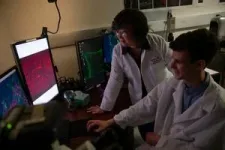(Press-News.org) University of Cincinnati researchers have pioneered an animal model that sheds light on the role an understudied organ in the brain has in repairing damage caused by stroke.
The research was published July 2 in the Proceedings of the National Academy of Sciences and sought to learn more about how the adult brain generates new neurons to repair damaged tissue.
The research team focused on the choroid plexus, a small organ within brain ventricles that produces the brain’s cerebrospinal fluid (CSF). CSF circulates throughout the brain, carrying signaling molecules and other factors thought to be important for maintaining brain function. However, prior to this study, little was known about the roles the choroid plexus and CSF play in brain repair after injury due to a lack of available adult animal models.
“We have discovered a new use of an animal model to be able to allow us to manipulate the adult choroid plexus and CSF for the first time,” said Agnes (Yu) Luo, PhD, corresponding author on the study, and professor and vice chair in the Department of Molecular and Cellular Biosciences in UC’s College of Medicine. “Now that we’ve discovered it, this will be vitally applicable to allow researchers to manipulate the adult choroid plexus and CSF to study different disease models and biological processes.”
UC graduate student and study coauthor Aleksandr Taranov explained that in a process called adult neurogenesis, the adult brain maintains a certain capacity to repair damage by regenerating newly born neurons.
“However, we still don’t know what actually regulates adult neurogenesis and how to redirect the neurons into the lesion site following a stroke,” Taranov said.
Using this new model, the researchers found that removing the choroid plexus — and the resulting loss of CSF in brain ventricles — led to a reduction of newly born immature neurons called neuroblasts. In a model of ischemic stroke, the team found the loss of the choroid plexus and CSF led to fewer neuroblasts migrating to the lesion site and repairing damage caused by a stroke.
“This suggests that the choroid plexus may be needed to retain these neuroblasts in the area where they usually reside,” Taranov said. “And the choroid plexus might actually be required to retain the neuroblasts so they can readily migrate into the stroke site whenever a stroke or other injury occurs.”
Essentially, Luo said, it appears the choroid plexus keeps a garrison of regenerative cells that are ready to be deployed to injured areas in the brain in animal models of stroke. Further research is needed to confirm whether this also occurs in human brains.
Moving forward, Taranov is studying how the loss of the choroid plexus and CSF affects the clearing of toxic proteins in a model of Alzheimer’s disease, and fellow graduate student Elliot Wegman is studying the same effects in a model of Parkinson’s disease.
Other study coauthors include UC’s Alicia Bedolla, and Eri Iwasawa, Farrah Brown, Sarah Baumgartner, Elizabeth Fugate, Joel Levoy, Steven A. Crone and June Goto of Cincinnati Children’s Hospital Medical Center.
This study was supported by National Institutes of Health grants (R01AG083164 and R21NS127177).
END
University of Cincinnati study: Brain organ plays key role in adult neurogenesis
Research published in the Proceedings of the National Academy of Sciences
2024-07-08
ELSE PRESS RELEASES FROM THIS DATE:
Small molecules induce trained immunity, opening a new approach to fighting disease
2024-07-08
Vaccines provide a front-line defense against dangerous viruses, training adaptive immune cells to identify and fight specific pathogens.
But innate immune cells — the first responders to any bodily invader — have no such specific long-term memory. Still, scientists have found that they can reprogram these cells to be even better at their jobs, potentially fighting off seasonal scourges like the common cold or even new viral diseases for which vaccines have not yet been developed.
A University of Chicago Pritzker School of Molecular Engineering (PME) team has found several small molecule candidates that induce this trained immunity without the ...
Erasing “bad memories” to improve long term Parkinson’s disease treatment
2024-07-08
BIRMINGHAM, Ala. — Common treatments for Parkinson’s disease can address short-term symptoms but can also cause extensive problems for patients in the long run. Namely, treatments can cause dyskinesia, a form of uncontrollable movements and postures.
In a recent study published in The Journal of Neuroscience, researchers at the University of Alabama at Birmingham took a different approach to dyskinesia and treated it like a “bad motor memory.” They found that blocking a protein called Activin A could halt dyskinesia symptoms ...
Restored oyster sanctuaries host more marine life
2024-07-08
In the campaign to restore Chesapeake Bay, oyster sanctuaries rank among the most hotly contested strategies. But new research suggests these no-harvest areas are working, and not only for the oysters. In a new study published July 4 in Marine Ecology Progress Series, Smithsonian biologists discovered oyster sanctuaries contain more abundant populations of oysters and other animal life—and the presence of two common parasites is not preventing that.
Oysters form the backbone of Chesapeake Bay. Besides injecting millions of dollars into the regional economy each year, they also act as vital habitat and filter feeders that clean the water. But their populations ...
Research spotlight: Machine learning helps identify patients at varying levels of risk for opioid use disorder
2024-07-08
Ronen Rozenblum, PhD, MPH, director of the Unit for Innovative Healthcare Practice & Technology and director of Business Development of the Center for Patient Safety Research and Practice at Brigham and Women's Hospital, and an assistant professor at Harvard Medical School, is the principal investigator and senior author of a new study published in JMIR Medical Informatics, “A Machine Learning Application to Classify Patients at Differing Levels of Risk of Opioid Use Disorder: Clinician Based ...
Detroit researchers receive Department of Defense grant to assist in discovering new treatments for ovarian cancer
2024-07-08
DETROIT — Gen Sheng Wu, Ph.D., professor of oncology in the Wayne State University School of Medicine and the Barbara Ann Karmanos Cancer Institute, recently received a grant from the U.S. Department of Defense’s Congressionally Directed Medical Research Programs.
This four-year, $924,000 grant will benefit Wu’s study, “Targeting Dual-Specificity Phosphatase 1 in Platinum Resistance in Ovarian Cancer,” which aims to discover improved treatments for ovarian cancer.
“Ovarian cancer ...
Acupuncture reduces methadone dose and opioid cravings in patients undergoing methadone maintenance therapy
2024-07-08
Embargoed for release until 5:00 p.m. ET on Monday 8 July 2024
Annals of Internal Medicine Tip Sheet
@Annalsofim
Below please find summaries of new articles that will be published in the next issue of Annals of Internal Medicine. The summaries are not intended to substitute for the full articles as a source of information. This information is under strict embargo and by taking it into possession, media representatives are committing to the terms of ...
Novel compound offers improved defense against fentanyl overdoses
2024-07-08
Scientists at the University of Florida have identified a novel compound aimed at improving the treatment of opioid overdoses, which claimed the lives of more than 81,000 Americans last year.
The discovery could combat the devastating epidemic of opioid-related deaths, driven predominantly by the proliferation of fentanyl. The highly potent synthetic opioid is a pain reliever and among the nation’s most abused substances.
“Fentanyl is driving the need to find better treatments for opioid overdoses,” said Jay McLaughlin, Ph.D., a professor of pharmacodynamics in the UF College of Pharmacy. “Every opioid death is preventable, highlighting ...
NIH awards Wake Forest University School of Medicine $27 million to study vascular health and its impact on cognition
2024-07-08
WINSTON-SALEM, N.C. – July 8, 2024 – Researchers at Wake Forest University School of Medicine have been awarded a five-year, $27 million grant from the National Institute on Aging (NIA), part of the National Institutes of Health (NIH), to renew funding for MESA-MIND, an ancillary study to the Multi-Ethnic Study of Atherosclerosis (MESA).
In 2018, researchers at Wake Forest University School of Medicine received more than $18 million from the NIA to launch MESA-MIND to study the connections between heart health and brain health.
“In MESA-MIND, we are studying how heart health contributes to brain health in diverse groups of people,” said Timothy Hughes, Ph.D., ...
College of Public Health receives NIH grant to pilot AI chatbot for African Americans with depression
2024-07-08
As a leader in innovative health solutions, George Mason University’s College of Public Health received a National Institutes of Health (NIH) AIM-AHEAD program grant to pilot an artificial intelligence (AI) chatbot for Black and African Americans with depression. Health Informatics Professor Farrokh Alemi will enhance his first-of-its-kind, evidence-based artificial intelligence tool to address the medication needs of African Americans with depression.
The existing AI tool recommends antidepressants for 16,775 general-population patient subgroups, each representing a unique combination of medical history. For each of ...
RCMAR Annual Meeting promotes mentorship and research on aging
2024-07-08
The latest Annual Meeting convened by the Resource Centers for Minority Aging Research (RCMAR) National Coordinating Center, held in Arlington, Virginia, from June 26 to 28, centered on the theme of transforming diverse aging research through inspiring and mentoring scientists.
Current and former RCMAR scientists presented research findings from completed pilot studies and progress updates for ongoing research. The meeting included several professional development sessions for the scientists and members of RCMAR ...
LAST 30 PRESS RELEASES:
Genetic risk for mental illness is far less disorder-specific than clinicians have assumed, massive Swedish study reveals
A therapeutic target that would curb the spread of coronaviruses has been identified
Modern twist on wildfire management methods found also to have a bonus feature that protects water supplies
AI enables defect-aware prediction of metal 3D-printed part quality
Miniscule fossil discovery reveals fresh clues into the evolution of the earliest-known relative of all primates
World Water Day 2026: Applied Microbiology International to hold Gender Equality and Water webinar
The unprecedented transformation in energy: The Third Energy Revolution toward carbon neutrality
Building on the far side: AI analysis suggests sturdier foundation for future lunar bases
Far-field superresolution imaging via k-space superoscillation
10 Years, 70% shift: Wastewater upgrades quietly transform river microbiomes
Why does chronic back pain make everyday sounds feel harsher? Brain imaging study points to a treatable cause
Video messaging effectiveness depends on quality of streaming experience, research shows
Introducing the “bloom” cycle, or why plants are not stupid
The Lancet Oncology: Breast cancer remains the most common cancer among women worldwide, with annual cases expected to reach over 3.5 million by 2050
Improve education and transitional support for autistic people to prevent death by suicide, say experts
GLP-1 drugs like Ozempic could cut risk of major heart complications after heart attack, study finds
Study finds Earth may have twice as many vertebrate species as previously thought
NYU Langone orthopedic surgeons present latest clinical findings and research at AAOS 2026
New journal highlights how artificial intelligence can help solve global environmental crises
Study identifies three diverging global AI pathways shaping the future of technology and governance
Machine learning advances non targeted detection of environmental pollutants
ACP advises all adults 75 or older get a protein subunit RSV vaccine
New study finds earliest evidence of big land predators hunting plant-eaters
Newer groundwater associated with higher risk of Parkinson’s disease
New study identifies growth hormone receptor as possible target to improve lung cancer treatment
Routine helps children adjust to school, but harsh parenting may undo benefits
IEEE honors Pitt’s Fang Peng with medal in power engineering
SwRI and the NPSS Consortium release new version of NPSS® software with improved functionality
Study identifies molecular cause of taste loss after COVID
Accounting for soil saturation enhances atmospheric river flood warnings
[Press-News.org] University of Cincinnati study: Brain organ plays key role in adult neurogenesisResearch published in the Proceedings of the National Academy of Sciences





